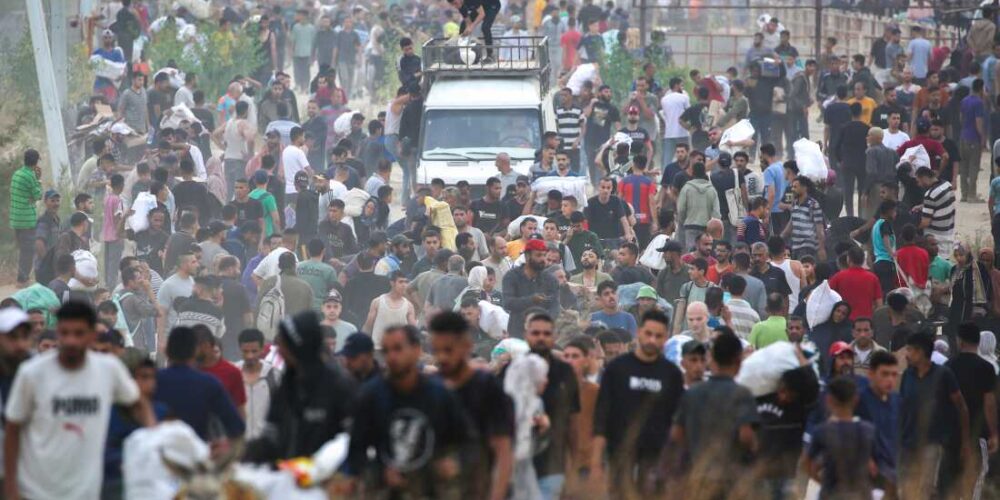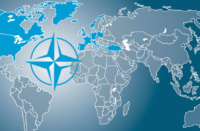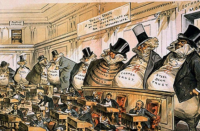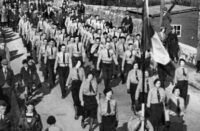Since February 2025, the Gaza Humanitarian Foundation (GHF) has presented itself as a relief initiative to ease hunger and suffering in Gaza, promising food, water, medicine, and shelter while blocking aid from reaching Hamas. Yet, this condition revealed its deeper purpose: aid transformed into a political weapon to reshape Palestinian society under U.S.–Israeli control. The GHF reflects a colonial–capitalist pattern where basic needs are manipulated to enforce submission, replace grassroots solidarity, and weaken resistance.
A Humanitarian Façade with a Security Core
The GHF’s leadership structure exposes its real agenda. Its board combined businessmen with former U.S. military and intelligence officers. Early figures included Nate Cook, ex-CEO of World Central Kitchen, and Jake Wood, a former Marine who resigned, denouncing the GHF as devoid of humanitarian standards. Leadership later passed to Johnny Moore Jr., an evangelical leader known for supporting Israel and advocating the forced displacement of Palestinians. John Acrey, with experience in Iraq and Afghanistan, tied the foundation directly to U.S. foreign policy.
The advisory board included ex-generals, UN and WFP officials, and former CIA and Mossad officers. No Palestinian was represented. Decisions, therefore, were not organisational but political–security moves to control Gaza and expand networks of influence. Independent humanitarian work was sidelined and transformed into a façade for a colonial project.
From Aid to Traps and Systematic Starvation
In May 2025, the GHF opened four distribution centres in Rafah, Gaza City, and Khan Younis. Run by companies led by former U.S. intelligence officers, these centres resembled military compounds rather than relief facilities. Reports soon labelled them death traps: over 850 civilians were killed and hundreds injured near the sites within weeks. Palestinian officials argued the centres managed starvation and enforced submission instead of delivering aid.
This reflects a broader colonial logic where food becomes a tool of control, not a human right. Access to aid was conditioned on compliance with occupation directives, effectively holding the poor hostage. Amnesty International, the WFP, and UNRWA refused cooperation, describing the sites as death traps. Testimonies revealed poisoned flour, narcotics, and the use of drones and facial recognition for surveillance. Hunger was thus weaponised, combining fear, deprivation, and social re-engineering—amounting to a slow genocide under a humanitarian façade.
Testimonies, Colonial Capitalism, and International Solidarity
Insider accounts have exposed the true nature of the GHF. Former employee and U.S. soldier Anthony Aguilar testified that civilians were deliberately targeted with gunfire at distribution centres. Jake Wood, the foundation’s ex-CEO, described it as “a colonial monstrosity of aid,” arguing that neutrality was impossible. David Burke, Chief of Operations, resigned in protest against coercive practices. These testimonies reveal that the GHF was never about relief but about dependency and domination.
This aligns with a broader pattern of colonial capitalism, where control extends beyond land and blockades to basic human needs like food, and water. Through conditional aid, surveillance, and engineered dependency, grassroots solidarity is dismantled. Bread itself becomes an instrument of domination, fusing military, political, and economic agendas under a humanitarian façade that masks exploitation and slow erasure.
In contrast, independent international solidarity offers a genuine humanitarian alternative. Organisations such as Save the Children and global humanitarian alliances provide unconditional assistance, independent of U.S.–Israeli security frameworks. True solidarity rests on humanity, neutrality, independence, and non-discrimination, affirming food and medicine as universal rights rather than bargaining tools. Around the world, genuine aid demonstrates that respect for dignity, not militarisation, is the foundation of humanitarian action—and a form of resistance to the colonial weaponisation of hunger.
Conclusion
The Gaza Humanitarian Foundation is not a relief body but a colonial–security front that weaponises food and aid to entrench domination. Its leadership and practices reflect efforts to reproduce capitalist and colonial control in Palestinian society. By contrast, international solidarity represents genuine humanitarianism—unconditional, apolitical, and rooted in dignity. Food is a right, not a tool of coercion, and true solidarity remains the only path to resisting colonial exploitation.
As Ghassan Kanafani wrote: “They steal your bread, then give you a crumb of it, and then command you to thank them for their generosity. How brazen they are.”






